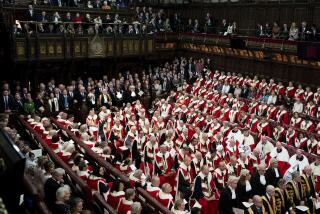House of Lords overhaul gets backing
- Share via
LONDON — Britain’s House of Commons took a historic step Wednesday to endorse a fully elected House of Lords, a move that could eventually end the reign of Parliament’s upper house as a seat of privilege and patronage.
After debating for the better part of a century a more democratic foundation for a house rooted in Britain’s aristocratic and baronial past, the House of Commons voted 337 to 224 to endorse the idea of a fully elected upper chamber. By an even greater margin, members voted to abolish the 92 seats still reserved for lords by virtue of having inherited their titles.
“I simply do not believe that in this less deferential, more assertive age, the public will tolerate a wholly appointed chamber for much longer. The choice in my judgment is stark: It is change or wither away,” said Commons Leader Jack Straw, who headed a government study committee that advocated moving to a partially elected house.
The vote was advisory only, and any actual change in the makeup of the 746-member upper house will require a separate vote on the nuts-and-bolts legislation.
The House of Lords itself will debate the issue next week, a process that leading reform proponent James Graham of the Elect the Lords campaign likened to “asking the turkeys to vote on Christmas.”
“It’s likely to go badly for us,” he said.
Under British law, the Commons is the dominant force in government, and it alone forms the government. The Lords can revise and delay legislation, but they cannot veto it.
Wednesday’s vote was crucial, because it was the first time the Commons had mustered majority support for fundamental reform of the Lords, and it signals Britain’s apparent determination to eventually do away with what is often seen as an anachronism among modern democracies.
In its first step toward reform in 1999, Parliament ended the rights of hundreds of hereditary peers to sit in the governing chamber, but 92 were permitted to remain. The others are so-called “life peers” whose titles, presumably awarded on merit or politics, are not handed down.
A scandal over allegations that peerages were handed out to major campaign donors, many of whom sit in the House of Lords, has fueled the reform push. Police are expected to hand over the results of that investigation to prosecutors within the next few weeks.
But more fundamental has been the growth of public sentiment against the notion that half of Parliament has no accountability to voters. Parliament members were told that a Hansard Society poll last month found that just 6% of respondents favored an all-appointed House of Lords and that 82% supported a wholly or partly elected chamber.
Some Parliament members have said it is perhaps inevitable that the 26 guaranteed seats for Church of England bishops in the House of Lords will have to be shared among Roman Catholics, Muslims, Jews and Hindus to reflect the nation’s increasing cultural diversity.
Prime Minister Tony Blair voted for an option that would split the house equally between elected and appointed members, a plan that would help alleviate critics’ concerns that electing all members of the House of Lords would politicize the chamber and render it a powerful rival to the House of Commons.
In previous standoffs, such as the House of Lords’ opposition to government plans to extend the time in which terrorism suspects can be held without charge, it eventually backed off. Analysts said the Lords lacked both the legal basis and the legitimacy to challenge the elected Commons.
“Once you give it some democratic legitimacy, it becomes more powerful, not less,” said Rodney Barker, professor of government at the London School of Economics.
Blair was elected on a pledge to reform the aristocratic arm of Parliament, but the project was to be more problematic than expected, Barker said.
“We have two potentially incompatible ideas in the House of Commons,” he said. “One is to remove the anomaly of an upper chamber with even a residual hereditary element. The other is to assure the supremacy of the House of Commons. And the more you resolve the first, the more you cause problems for the second.”
In the two-day debate that ended with Wednesday evening’s vote, Conservative lawmaker John Maples argued that the House of Lords needs no reform.
“The House of Lords is exactly what we say we want,” he said. “It is independent. Some of its members have significant expertise. It has limited power. It does not challenge the House of Commons. And all parties are represented, although none of them has a majority. It does almost everything that we want it to do, but it does not satisfy the test -- apparently, it must do so -- of whether or not it is democratic.
“We have a solution in search of a problem.”
Reform proponents have said a long term for elected Lords members, perhaps as long as 15 years, would help alleviate politicization of the body.
The proposal for 50-50 elected representation, favored by the government, won only a minority of votes, 155 compared with 418 opposed. Another option for a greater number of elected seats, 80%, was endorsed 305 to 267. An all-elected house won the greatest share of votes.
Drafting and voting on a bill to implement the plan could take at least a year and is likely to stretch past the next general elections, analysts said.
*
More to Read
Sign up for Essential California
The most important California stories and recommendations in your inbox every morning.
You may occasionally receive promotional content from the Los Angeles Times.










